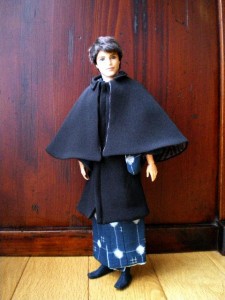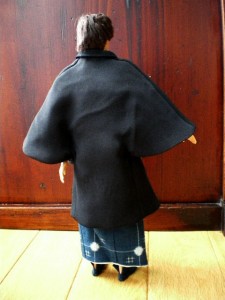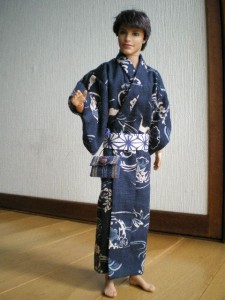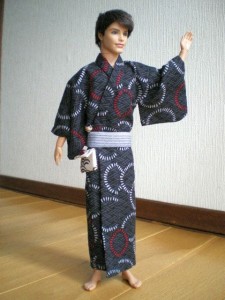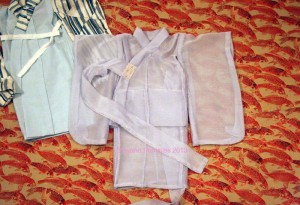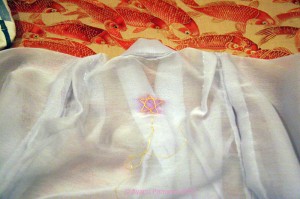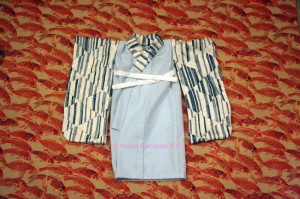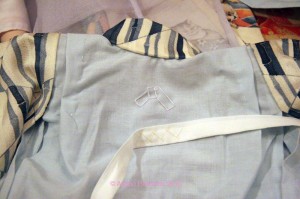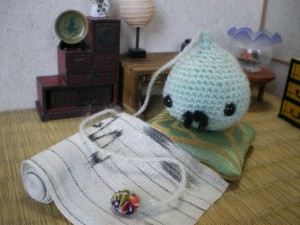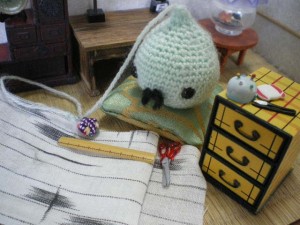Grand Duchy of Roshino, Jodelnneur State, City of Nienieberg, Kinoko District
ロシーノ大公国ヨーデルヌール州ニーニーベルグ市きのこ地区
Clean the Whole House! 1 大掃除!1
そろそろ年末です。
日本では、年末に大掃除をします。
It’s close to the end of the year.
In Japan, we do this thorough cleaning at the end of the year
to welcome a new year.
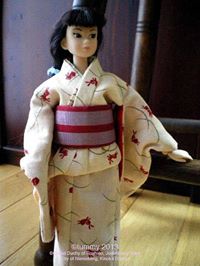 大掃除をするときには、このままでは動きにくい上、汚れてしまいます。
大掃除をするときには、このままでは動きにくい上、汚れてしまいます。
With kimono, it makes difficult to move and
moreover, easy to get dirty.
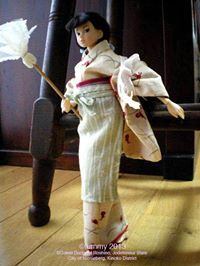 そこで、長い袖は「たすき」で邪魔にならないようにして、前掛けをつけます。
そこで、長い袖は「たすき」で邪魔にならないようにして、前掛けをつけます。
さあ、お掃除です!
Therefore, we tuck up kimono sleeves with tasuki (fabric cords)
so that they don’t bother your move
and wear an apron.
Now, let’s start cleaning!
1/6 Tonbi Coat: Men’s overcoat for kimono お人形のトンビコート
とんびコートは、着物の上に着るためのコートです。
I made tonbi coat for 1/6 size doll.
Tonbi coat is similar to the Inverness coat
putting on over kimono.
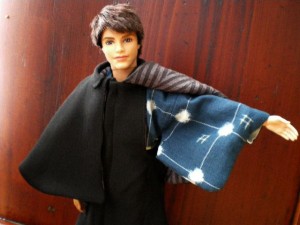 着物の袖が邪魔にならないように、ケープの下は袖がない作りになっています。
着物の袖が邪魔にならないように、ケープの下は袖がない作りになっています。
As you can see, it doesn’t have sleeves under the cape
it is because there are full kimono sleeves.
The back of the cape is a part of back body: it is one piece.
Come to think of it, I realized this tonbi coat is
much similar to the Inverness cape: the cape split in two and a small cape on
each side was sewn into the side seams
not taken across the back(*), but not exactly same.
*source from wikipedia: Inverness cape
Doll’s Yukata 5 ケンの浴衣2
仕立て屋フンボルトさん、今年最後のお仕立て上がり浴衣です。
紺地に流水とうさぎの模様、帯は麻の葉です。
帯に挟んであるのは、煙草入れです。
Tailor the Humboldt’s last works of yukata for this summer.
Kimono is flowing water stream and bunny pattern in solid navy
and obi is a geometric hemp-leaf pattern.
A small bag hanging from obi is a cigarette case.
こちらは、籠目模様の地に丸。帯は縞です。
煙草入れは、上の紺の浴衣地の色違いの生地で仕立てました。
This kimono has circle print on hexagram pattern.
Obi is a striped pattern.
Cigarette case is made out of the same print fabric but in different color
as the kimono in the top picture.
Ichimatsu doll custom: Kasane 市松人形のかさね
長襦袢と着物の間に着ます。
夏物なので薄い涼し気な布にしてみました。
This is Akira’s Kasane.
Put it on between Nagajuban and Kimono.
Since it is for summer, I chose very thin and fine fabric.
周辺の紫はチャコペンがにじんでいる色です。
これはすぐに消えるものです。
A semamori, a lucky pattern embroidery is a star.
Purple color around it is an ink spread
of a fabric marking pencil, which will disappear in a day.
Ichimatsu doll custom: Nagajuban 市松人形の長襦袢
袖と半襟はシルクです。
竹を青い墨絵で描いた模様です。
I sewed Akira’s nagajuban (a full-length undergarment worn under a kimono).
Sleeves and haneri (a decorative collar on an under-kimono) are
made out of silk fabric.
Its pattern looks like some bamboo painted with a blue ink.
念のため入れてみました。
結び文です。
I was not sure a nagajuban needs semamori (lucky pattern embroideries
on the back of kid’s kimono, which protects a child from bad luck)
but I put it anyway, just in case.
It is a knotted-letter.
Doll’s Yukata 1 ケンの浴衣製作中1
「良い絣じゃの」
フンボルトさんは洋服も仕立てられますが、和服の仕立てもできるのです。
“This is a good fabric with splashed patterns”.
Mr. Humboldt can tailor western clothes but he also can
tailor Japanese traditional clothes like kimono and yukata.
「もう夏じゃから、ひとつケン氏に浴衣を仕立てるかのう」
“Let me tailor a yukata for Ken since summer is just around the corner.”
